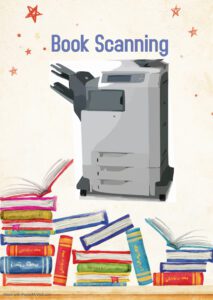Who doesn’t love a great book?
Whether you wish to turn a family inheritance handed down from one generation to another in the form of a digital file, or you want to take your favourite reading book on a holiday trip to the beach.
Book scann ing offers a multitude of benefits for book publishers as well as to its avid readers.
ing offers a multitude of benefits for book publishers as well as to its avid readers.
Bringing your books to the digital age will have numerous benefits. The most prominent in the list is convenience. When you convert your favourite books to digital format, you can read from a digital device without carrying the baggage of large and heavy books. By converting it to a digital format, you have all the content you need at your fingertips. A digital version allows you to quickly find the chapter, page, or information you need without flipping through multiple pages. You can easily share text online or on your blog.
With the Scanning books option, you can produce a crystal-clear, easy-to-read file that allows you to share with a click.
Key advantages of Book Scanning
- Share Content Efficiently- Allows sharing across digital platforms, can share content with multiple users at a go compared to the printed book where the provision of sharing is limited to only one person at a time
- Content Accessibility – Easily search information and quick access to the internal content like chapter, page, or keyword
- Digital Archive Library – Option to create the digital archive library of your book collection
- Content Retention – You can manage and secure your content in a better way, Digital files are environment friendly, Economical and Durable
- Digital Preservation – Enable paperless process and convert all preserved books to secured digital format
- Better Storage Management – Occupy less space and last longer compared to printed books
- Cost-Effective – Digital format files are much cheaper when compare to printed books, there is no Paperback Covers cost, no Paper Printing cost, no Packaging cost, no Shipping cost incurred, and also last longer with low storage occupancy.
Thumb rules for scanning books
If you wish to create high-quality digital format files, you should definitely consider these 3 criteria while scanning books.
- Resolution – The optical resolution of your scanner plays a key role. It has a great impact on image quality. If you’re scanning text or a news article, a resolution of 300 dpi should be sufficient, but in the case of scanning picture books or photos, we strongly recommend upgrading to 600 DPI. The higher the DPI, the better is the image quality output.
- Document Processing (Features and Advantages) – When you are scanning a book, you may not want to save the introduction. You may want to remove unnecessary pictures or add text or voice annotations for other people to read. With Apex expertise, you can achieve this by reprocessing your scanned books with unlimited possibilities. Scanning books process can become as easy as reading the alphabet.
- Optical Character Recognition (OCR) – Most scanners available in the market come with an OCR engine. This astonishing OCR technology not just allows you to convert but bring life to your book. You can easily convert your books into documents of your choice like Searchable PDF (for searching text), Word / editable text format, ePub format (for ebook readers), and audio format ( WAV or MP3 format). Apex has the most advanced book scanners with integrated OCR technology














